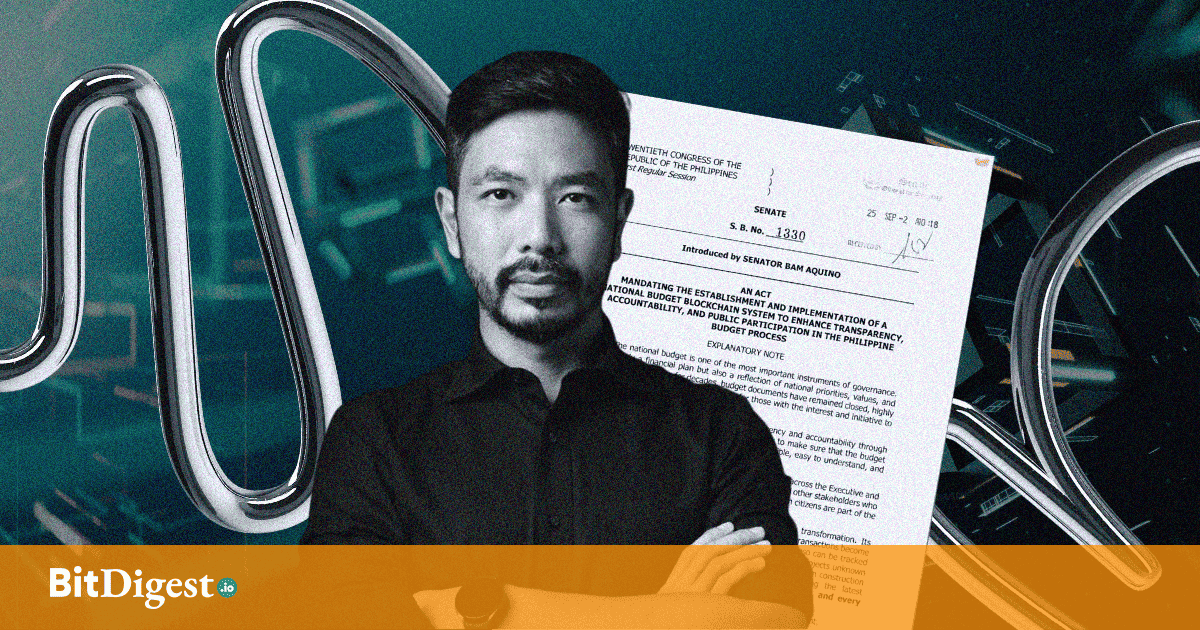EXCLUSIVE: Luis Buenaventura Weighs In on the Blockchain Budget Bill
As debates continue over Senate Bill No. 1330—informally dubbed the “Blockchain the Budget” bill—voices from the crypto industry are also weighing in. One of them is Luis Buenaventura, a long-time blockchain advocate and Head of GCrypto at GCash.
Despite his deep involvement in crypto, Buenaventura expresses strong reservations about the bill’s approach.
“I am against the bill because I see it as a waste of taxpayer money,” he says. “Unless we are willing to actually tokenize the entirety of the Philippine Peso’s circulating supply, it is technologically impossible for a blockchain platform to curb the kinds of corruption we’ve been investigating in the Senate over the last several weeks.”
Concerns About Effectiveness and Industry Impact
The bill seeks to use blockchain infrastructure to improve transparency and traceability of national budget flows. However, Buenaventura warns that mandating such a system might overstate the technology’s current readiness and potential for impact.
“Because I’m a crypto advocate, I see it as damaging to the reputation of the industry when the project inevitably fails to address any of the problems it allegedly promised to fix,” he explains. “But of course, the most significant risk is simply that it won’t work, and the corruption will continue.”
His concern is less about the technology itself and more about scale and expectations. He points out that no other country has attempted a blockchain-based system for budget tracking at this level.
“My belief is that blockchain technology isn’t ready for this level of usage,” he notes. “The fact that no other country has ever committed to a blockchain-based system at the scale that is being proposed here should tell you everything you need to know.”
“Issues of data-access latency, overall user experience complexity, and long-term sustainability are all still being figured out, which is why there are nothing but small-scale pilots out there.”
On Readiness and Institutional Track Record
Buenaventura also raises questions about whether the Philippines is prepared for such a technological leap, given its track record in blockchain development.
“The Philippines has never been at the forefront of blockchain research and development, and has no track record of innovation in this area,” he says. “Why are we suddenly so willing to bet our national budget on this?”
Recommendations for a Revised Approach
When asked what a more practical approach might look like, Buenaventura suggests removing any direct reference to blockchain in the bill.
“I think the bill should be redrafted without any mention of blockchain and should instead be framed purely as ‘public transparency through technology,’” he recommends.
He also advocates for the involvement of media and watchdog groups in driving transparency, with technologists serving as support—not as central actors.
“It should involve the independent media and non-profit watchdog groups as its driving force, and bring in the technologists purely as builders.”
Buenaventura emphasizes that technology, while powerful, is not a substitute for systemic accountability.
“Technologists often see themselves as saviors because they feel like they can solve any problem with the right software implementation,” he says. “But that’s only true if they have the domain knowledge to accurately scope the problem.”
“We already have the fourth (and fifth) estates for this, the traditional and non-traditional media. Technology is just a tool for them to reveal truths to the general public (the third estate).”
On Confidence in Blockchain for Governance
Although a well-known crypto builder, Buenaventura remains cautious about blockchain’s application in public governance.
“I have very low confidence that it will work, because it’s never been done anywhere before at a national scale,” he says. “Anybody who has high confidence in this matter is doing so without evidence. That doesn’t necessarily mean that they’re wrong, but it does mean that they are relying on faith instead of proof… and this is somewhat the antithesis of blockchain.”
Buenaventura’s perspective adds nuance to the broader debate over digital governance. While he doesn’t reject blockchain’s utility, his argument reflects a call for careful, standards-based implementation, rather than bold declarations of intent. His critique is not against innovation, but in favor of evidence-based policy and clear public interest safeguards. “Faith without proof is not blockchain,” he concludes.
.svg)


.svg) SHARE TO FACEBOOK
SHARE TO FACEBOOK SHARE TO TWITTER/X
SHARE TO TWITTER/X SHARE TO LINKEDIN
SHARE TO LINKEDIN SEND TO MAIL
SEND TO MAIL





.svg)


.svg)